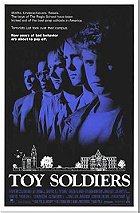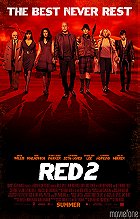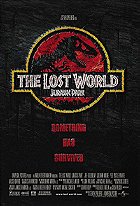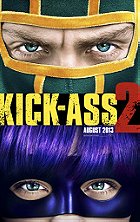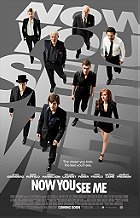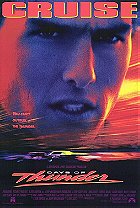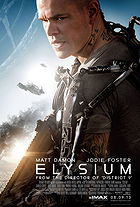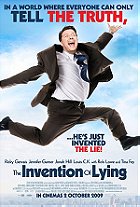At long last receiving a theatrical release after hitting the film festival circuits in 2011, You're Next is one of 2013's most critically acclaimed horror outings, generating a lot of online buzz. What a shame, then, that all the hype is for naught. Directed by Adam Wingard and written by Simon Barrett, this independently-produced slasher flick is ridiculously weak and hopelessly predictable, content to go through the telegraphed motions without any sense of style or sophistication, and without ever raising a viewer's pulse by even a single beat. Apparently, the film is meant to be some type of satiric deconstruction of the popular "home invasion" subgenre, but it lacks the nuance and creativity to achieve such a goal. You're Next is actually just a really bone-headed and painfully clichéd slasher, never coming across as effective satire.

To celebrate their thirty-fifth wedding anniversary, wealthy couple Paul (Rob Moran) and Aubrey Davison (Barbara Crampton) set out for their remote country house for the weekend, inviting their adult children and their respective partners to commemorate the occasion. It doesn't take long for tensions to run high in the family as they settle down for the celebratory dinner, but things are soon interrupted by a group of armed assailants wearing animal masks. Storming the premise, the members of the household are killed off one by one, compelling Erin (Sharni Vinson) into action, who hopes to survive the slaughter and save anyone that she can.
If Wingard and Barrett intended You're Next to be a serious horror flick, they missed the mark by a long shot. The picture almost immediately plummets into an abyss of terrible writing, acting and directing, and it never recovers as it moves forward at a snail's pace. When people refer to "typical horror movies" that cheapen the genre, You're Next is exactly the type of film they are referring to. The script may as well have been regurgitated by a computer, as Barrett stuffs the picture with scene after scene of contrived situations and idiotic character actions. One character even asks, "Hello?" into the darkness, and at other times, characters wander around dark parts of the house alone even though there are murderous psychopaths inside. Worse, Barrett includes a few revelations about the true motivations behind the murders that should be shocking but instead come off as forced and hoary. There is no intelligence to the writing; You're Next suffers from some of the laziest, dumbest scripting that the horror genre has seen in years.

The only character who reacts smartly to the situation is Erin, who grew up in a survivalist compound and is skilled at offence and defence. Erin becomes the story's heroine, using an array of impromptu weapons to defend herself and actually giving the attackers a fight. When Erin turns the tables on the murderers, You're Next provides its only entertaining moments, though it's more of a "beggars can't be choosers" situation due to how dire the film has been until that point. Vinson acquits herself somewhat effectively in the role of Erin, but the rest of the actors deliver stiff, unconvincing performances. It's not all their fault, however, as one can only do so much with this amateur-hour material. Admittedly, horror fans will appreciate some of the casting choices, including B-movie scream queen Barbara Crampton (Re-Animator, Body Double) and celebrated young horror director Ti West (The Innkeepers), who plays a filmmaker character. Unfortunately, Wingard's directorial technique is slipshod, overusing shaky-cam effects to try and generate tension, but to no avail. Moreover, the photography is exceedingly ugly in terms of composition and colour palette, and no amount of lazy jump-scares can compensate for the fact that none of the actors can emote a convincing look of terror when one of their family members is butchered right in front of them.
If You're Next was designed to be a satire, it falls way short of its mark. The art of satire requires a deft sleight-of-hand, as evidenced in films like Shaun of the Dead and Black Dynamite. Wingard's technique is too outright drab and lacking in energy, making this an oddly joyless experience regardless of its intentions. One supposes that Wingard wanted to make a postmodernist, meta treat like Scream or Cabin in the Woods, but it lacks the required sense of wit and invention. To its credit, the film does work at times, including a few gory killings and a handful of moments that provoke intentional hilarity. As for the rest, it's difficult to figure out which tone Wingard is aiming for at any one time.

Outside of a halfway decent performance from Vinson and an agreeable synth score that evokes the old films of John Carpenter, You're Next is pure guff, an agonisingly incompetent wannabe slasher that fails on practically every level. Maybe devout horror buffs will get a kick out of the visceral killings, but everyone else will be turned off by the anaemic acting talent, lack of tension, horribly written dialogue and shoddy story. It honestly feels as if a group of aliens tried to make a movie mimicking our tendencies to the best of their understanding, and people only embraced the end result because it's so dunderheaded that they assume it must be a joke. You know what would've improved the movie by a hundredfold? If, in the end, it was revealed that it was just a student movie made by a (fictional) pretentious pseudo-intellectual, and the last few minutes contained genuine satire that delved into the mindset of everyone behind the scenes. Such material could've redeemed You're Next; as it is, it's a joke without a punch-line.
2.7/10
 Login
Login
 Home
Home 183 Lists
183 Lists 1674 Reviews
1674 Reviews Collections
Collections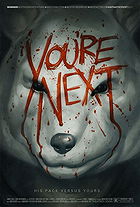
 0 comments,
0 comments, 